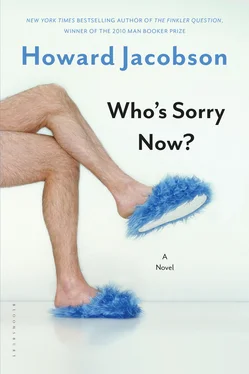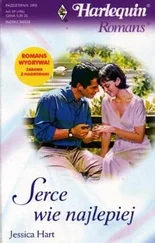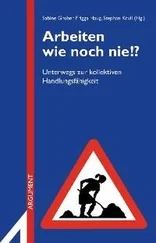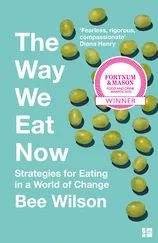‘Which doesn’t stop you from supposing you just might be,’ Dotty e-mailed back.
‘Are you laughing at me?’ Chas typed.
‘No. I think you should have a good time and hang the consequences,’ Dotty promptly replied.
‘Which are bound to be dreadful?’
‘Dire, darling. Have fun.’
So fun was what Chas had logged off and decided to have.
He took her to a trade fair.
Fun? He’d show her fun.
‘We can drive or we can fly or we can get the train,’ he told her.
‘Where are we going?’
‘Harrogate.’
‘Then let’s turn it into an adventure. Let’s go by train.’
‘What you have to understand,’ he explained, over a Great North Eastern breakfast, ‘is that there are trade fairs and trade fairs. Some I go to are dedicated leather goods and luggage shows — the hard-core, big-name stuff, Globetrotter and Constellation cases down one row, Longchamps, Picard, shocking-pink Pollini clutch bags made out of ostrich up another. Some are fashion events which also do accessories — good for off-the-wall items, copper-mesh evening bags, chain-mail belts, silk purses made out of sows’ ears. Where we’re going is more of a gift fair, which encompasses just about everything, even arts and crafts.’
‘Are those sops to my rural origins?’ Chas asked.
‘Not at all. They are calculated insults to the memory of my cosmopolitan father. He made it a point of honour never to have anything handmade on his stall — “You call it handmade, I call it drek,” was how he charmingly put it. So I make it a counter-point of honour to dabble in a little tooled leather when I can. It sells sometimes, as well, amazingly enough. Even in Wimbledon you get the occasional backwoodswoman. And now, of course, there’s line dancing.’
‘It astonishes me just to hear you say the word craft,’ she said, ‘let alone to discover you actually stock it. I thought it was a point of honour with you that everything you sold had to have the stitching inside? ’
‘And cost a million pounds?’
‘At least.’
He smiled sourly at her. She thought him slick. Glitzy. A pedlar of overwrought merchandise for Saudi Arabians or women of the Cosa Nostra. It was an underlying grievance in his relations with the Charlies that they had always backed away from the facts of how he earned his living, much as if he’d been a shyster lawyer or a moneylender. Every marketing detail of every book they’d ever written he’d lived through with them — titles, covers, reviews, awards. ‘Look, what do you think?’ Charlie used to come charging down the stairs to cry, holding aloft the latest volume, before the Kreitmans had even got their coats off. ‘New illustrator. Yes or no?’ But if Kreitman so much as mentioned briefcases the Merriweathers would suddenly smell something burning in the kitchen, or remember a stranded child they had to pick up. Don’t get him wrong — he didn’t want to talk shop, he wanted to talk Kultur — that was the whole point of dining at the Merriweathers once a fortnight — but a little quid pro quo wouldn’t have gone amiss. Once in a while they might have expressed concern that a consignment of hand-painted lipstick cases from Gujarat had gone missing in the earthquake, or bothered to remember that Kreitman had launched a new line of mobile-phone cases in the finest kidskin, designed exclusively for his shops by him — ‘So how are they going, Marvin?’ they hadn’t asked. He wasn’t looking for a major conversation, just the small change of amicable enquiry. Nor was he looking, quite, for social acceptance — unless he was.
The one exception to this blanket distaste, ironically enough, was trade fairs. Kreitman had only to say he was off to a trade fair and Charlie Merriweather’s face lit up. ‘Full of carbuncled rogues and louche auctioneers, will it be?’ he asked.
‘It’s not that sort of a fair,’ Kreitman told him. ‘Forget Smollett and Surtees. It’s not a horse fair. It’s not a carnival of the picturesque trades. It’s just a thousand stalls with hard shell suitcases on them and a bunch of dead farts taking orders.’
‘Clerkly types? I love those. Brown overalls and pencils behind their ears?’
‘Those are cheesemongers, Charlie.’
‘Lots of roistering?’
Kreitman sighed. ‘The major manufacturers usually offer you a small drink and a crisp. And the people at the glamour end, if they’re there, as like as not have a dozen fridgeloads of champagne on their stalls, though I wouldn’t call what they do roistering — more falling asleep.’
‘What about at night? Do you all stay at the same hotel?’
‘Usually at the same nine or ten hotels. You do the rounds.’
‘And what happens?’
‘There’s a great dealing of eating, much adding up of order forms, usually under the table, and some modest wife-stealing, but not enough to get excited about.’
‘Sounds riveting,’ Charlie enthused. ‘I do wish you’d take me with you.’
But because he didn’t appreciate being the Merriweathers’ day at the races, the channel through which the raw sewage of human vitality flowed into the Merriweathers’ cautious lives, Kreitman never did take Charlie along. Now here he was, taking Charlie’s wife.
Was life strange or was life strange?
‘What you’ll find,’ he told Chas, ‘is that the wider the gap between the actual value of the object and what it fetches, the nicer to be with those who sell it. If you ask me who I really look forward to seeing up here it’s the boys who sell sunglasses. How much do sunglasses cost to manufacture? Not a brass razoo. What do they sell them for? A king’s ransom. And like it or not, the size of that discrepancy lifts a burden from the personalities of people in sunglasses. No bitterness, you see. Potters and woodcarvers on the other hand, whose margin is their labour, are the least amicable souls here. Shouldn’t be so but is. It goes against everything I’ve been taught. And against everything I believe in. But there you are. Nothing smooths the path of social intercourse like easily won prosperity.’
‘Is that your motto?’
‘No. My motto is life is cruel. But we’re here to enjoy ourselves.’
‘I thought we were here for you to buy bags.’
‘Same thing. Follow me.’
They were in a grand floral hall, of the sort Chas remembered skipping through as a girl, holding her mother’s hand, and, once in a blue moon her father’s, wondering what made one onion arrangement win first prize and another identical onion arrangement win no prize at all. She had tasted cheese in a room just like this, and pulled a face after sipping elderflower wine. And later, in similar halls in Frankfurt and other cities of the children’s book, she and Charlie had been trailed round foreign publishers, made a fuss of and quizzed greedily on future projects. (Ah, Charlie!) But for those memories, she could take such a space or leave it. It was a big room, that was all. Kreitman, on the other hand, was enchanted by it. ‘Stuff as far as the eye can see,’ he marvelled. ‘Don’t you love it? Heaven will be piled high like this. Maybe with handbags and purses, maybe not, maybe leather goods are kept in hell, but lobbied and full of light just like here, high-domed with metal girders and glass roofs, with lots of little tables to have sandwiches at, and all the inexhaustible plenty of paradise laid out on stalls in numbered avenues.’ She felt she was with a small, hungry boy. ‘Were you denied presents as a child?’ she wanted to ask him. ‘Were you forced to go without?’ But she didn’t dare. And in the end didn’t want to. Why break the spell? This was a side of him she hadn’t expected to find. Marvin Kreitman, verdant! Sometimes, she was sure without his even knowing he was doing it, he squeezed her arm. Look, Chas! Look! Look at what? Quantity, that was all. Sheer volume. She was astonished by him. Who’d have thought it? Marvin Kreitman, as fired up by simple abundance as a kid in Santa’s grotto!
Читать дальше












